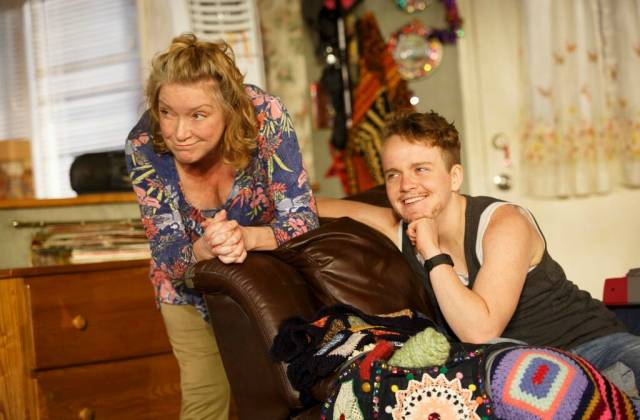

Hir takes place in the battlefield between the past and the future. The past is represented by the patriarchal system that allowed heterosexual men to be complete “masters” of their domain - whether that meant a literal war zone, or their homes - where they could exert control through violence and repression. The future comes in a slightly more exuberant wrapping, in the shape of queer, cultured youths and the women who raised them and have finally had enough of the men who tried to suppress their spirits. One could say, that this is perhaps a battle that’s been fought since the beginning of time (or at least since the biblical episode of Noah’s Ark as one of the characters in the play suggests), but its face has never been as clear, and oft-daring, as it is today.
This is perhaps why the play opens with Arnold (Daniel Oreskes) looking straight at the audience, he’s wearing a dress and clown makeup and wig. A vague expression on his face. Near him is Paige (Kristine Nielsen), his wife, an expression of fearful hope in her face, she looks into the distance waiting for something that we know will make or break her. They are surrounded by laundry scattered all over the floor, furniture and decorations straight out of Grey Gardens, a vision of hell for OCD sufferers, and a paradise of anarchy for those who oppose traditional notions of order. There’s a knock on the door, and we realize Paige has been waiting for her son Isaac (Cameron Scoggins) to return from the Middle East where he served in Mortuary Affairs, by collecting the body parts of his dead colleagues.
Isaac learns that much has changed since he left to the war, not only has his father suffered a stroke that incapacitated him, he’s also become the object of his mother’s playful contempt. After years of making her miserable, she now finds solace in emasculating him to feel safe at last. Isaac’s youngest sister has also changed a lot, she now goes by the name of Max (Tom Phelan) and has the “engorged” sexual organ to go along with his new gender identity.
Feeling betrayed by his notion that his mother and brother destroyed his home, while he was away defending their right to freedom, Isaac tries to show “reason” to his family, but finds they have very strong arguments to defend their case. There is absolutely nothing subtle about Hir, and why should there be? The ideas in the script are there to slap us and shake us out of our comfort zone. Written by the multi-talented Taylor Mac, the play is even structured as a debate, with the first act presenting us with a worldview that is turned on its feet as the curtain rises during act two. Mac is too perceptive a writer to pretend to have the answers to any of the questions asked in the show, and director Niegel Smith takes full advantage of this by staging the play as a John Waters/Tennessee Williams hybrid, in which powerful symbolism is only subverted by the vulgarity through which it’s expressed.
And this is no offense, for this is a play that intends to be crass, loud and larger than life, because it knows its points need to be heard. Large part of what makes Hir special comes from audience reactions, something that has become a trademark of Mac’s work. Even if this play isn’t necessarily “interactive”, it’s impossible not to take notice of how loudly people express their opinion of what they’re seeing unfold onstage. Some will holler showing respect at Paige’s challenging lines, while others gasp and nod in disapproval of her unorthodox methods. It’s clear that the battle being fought onstage is also being fought within the audience.
It’s a joy then that this battle is so efficiently led by Kristine Nielsen, who role after role, keeps proving she is nothing if not a treasure. She injects Paige with an innocence that recalls both George S. Kaufman’s kookiest heroines, and also some of Williams’ most tragic Southern belles. Paige is a woman who is discovering herself in the second half of her life, but is having trouble reconciling the youth of her newfound spirit and the aging of her physical body. Nielsen aces the comedic lines providing the character with little nuances that make her a marvel to behold, but also proving that with these mannerisms she is shielding Paige from cruelty, sometimes at the cost of reality. She encompasses the essence of Hir, which often asks us if we’d rather fight the fight or clown around pretending everything is fine.